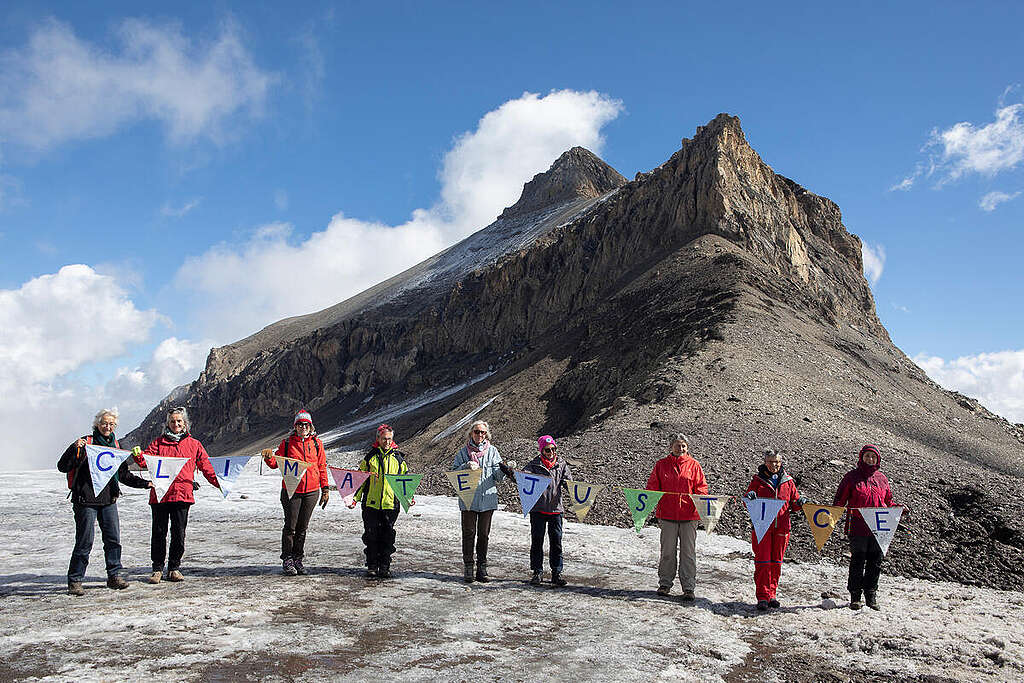The Federal Council continues to ignore the requirements for climate protection that are in line with human rights. It disregards the fact that the judgment of the European Court of Human Rights (ECtHR) in the case of the KlimaSeniorinnen Schweiz (Swiss Senior Women for Climate Protection) still needs to be implemented. In addition to the failure to implement, the Federal Council has also failed to provide scientific evidence for this politically motivated positioning: Switzerland’s climate targets are not based on a national CO2 budget that is aligned with the remaining global CO2 budget for compliance with the 1.5°C limits.
The position presented today by the state government on the judgment of the ECtHR lacks comprehensible justification. Instead of taking a serious look at the requirements for a climate policy that complies with human rights as set out in the precedent judgment, the Federal Council is responding with assertions that have already been refuted or rejected in the court proceedings. Closing the regulatory loophole in the CO2 Act and the new Electricity Act is insufficient to remedy human rights violations.
The most serious omission – although expressly required by the judgment (§§ 569 ff. in the judgment): The Federal Council does not explain to what extent Switzerland’s still planned emissions are actually compatible with ensuring that global warming does not exceed 1.5°C. The ECtHR has established this warming limit of 1.5°C, which is recognised by Switzerland and supported by the population, as a human rights-relevant parameter.
To ensure that the 1.5°C limit is not exceeded, compliance with the remaining global CO2 budget is crucial. This must be shared among all countries. This means that national CO2 budgets must relate to the global budget. National budgets without reference to a global budget only state how much CO2 a country allows itself – without taking into account the remaining global budget and the claims of other countries. Such an approach cannot ensure that global warming does not exceed 1.5°C and is therefore contrary to human rights.
Switzerland has not yet been able to provide any concrete figures on a national CO2 budget. However, it is already clear today: with the CO2 Act in force until 2030, the Federal Act on a Secure Electricity Supply from Renewable Energy Sources and the Climate Protection Act adopted by the people, Switzerland is claiming far too large a share of the global budget. If each state acted like Switzerland, the earth would warm by up to 3°C.
The Federal Council attacks our human rights. Human rights are universal rights and they are inherent to us all. By refusing to review and strengthen its climate protection policies in line with the human rights obligations detailed by the ECtHR, the Federal Council continues to aggravate ongoing human rights violations. This is a slap in the face for citizens and for all older women who particularly suffer from the consequences of global warming, as the latest Swiss monitoring of heat-related deaths once again shows. The Federal Council’s approach is not worthy of a state governed by the rule of law.
Therefore, the KlimaSeniorinnen Switzerland and Greenpeace Switzerland continue to call for an independent scientific analysis of the national CO2 budget, which is harmonised with the remaining global CO2 budget for compliance with the 1.5°C limit. A climate policy that complies with human rights must be developed and implemented based on this national CO2 budget. In concrete terms, this means that Switzerland’s targets and climate protection measures must be in line with the CO2 budget, otherwise, they will be insufficient.
Stricter procedure for KlimaSeniorinnen judgment
The Committee of Ministers of the Council of Europe monitors the implementation of the judgment. In its decision of 14 June 2024, the Committee decided to monitor the implementation of the KlimaSeniorinnen judgment as part of an enhanced procedure because the implementation of the judgment is complex.
No later than six months after a judgment becomes legally binding, the state concerned must submit an action plan to the Committee of Ministers containing the planned measures and a timetable for implementing the judgment. In the case of the KlimaSeniorinnen, Switzerland’s action plan is due on 9 October. The complainants and civil society can also communicate their views to the Committee of Ministers.
Next climate case before the ECtHR
The climate judgment has already had various international repercussions. Recently, the ECtHR prioritised the climate case against Austria and demanded a statement from the Austrian government on various issues. Most of these questions are based on the human rights requirements for climate protection developed in the KlimaSeniorinnen judgment. Similarly, the pending case brought by Greenpeace Nordic and others against Norway is moving forward with responses to questions based on the Klimaseniorinnen decision. New cases are being brought domestically based on the decision, such as in Finland and Germany. At the Inter-American Court of Human Rights hearing on an expert opinion on the climate emergency and human rights in April, various states already referred to the judgment of the ECtHR.
More information
Here are the documents relating to the judgment:
- Summary of the decision and relevant extracts from the judgement by Cordelia Bähr, lead lawyer of the KlimaSeniorinnen Schweiz association, in English, German, French and Italian
- Questions and answers on the KlimaSeniorinnen judgment in German and French
- Judgment in French and in English
- Press release of the ECtHR in French and English
- Questions and answers on the three climate judgements of the ECtHR in English and French
Contacts
- Cordelia Bähr, Lawyer of Senior Women for Climate Protection Switzerland: [email protected], +41 78 801 70 34
- Rosmarie Wydler-Wälti, co-president of Senior Women for Climate Protection Switzerland: [email protected], +41 61 302 96 35 (for interviews in German)
- Anne Mahrer, co-president of Senior Women for Climate Protection Switzerland: [email protected], +41 79 249 72 17 (for interviews in French)
- Elisabeth Stern, member of the board of Senior Women for Climate Protection Switzerland: [email protected], +41 79 351 22 00
- Pia Hollenstein, member of the board of Senior Women for Climate Protection Switzerland: [email protected], +41 79 740 04 50
- Norma Bargetzi, member of the board of Senior Women for Climate Protection Switzerland: [email protected], +41 79 352 98 89 (for interviews in Italian)
- Georg Klingler, Project Coordinator and Climate Campaigner Greenpeace Switzerland: [email protected], +41 79 785 07 38




